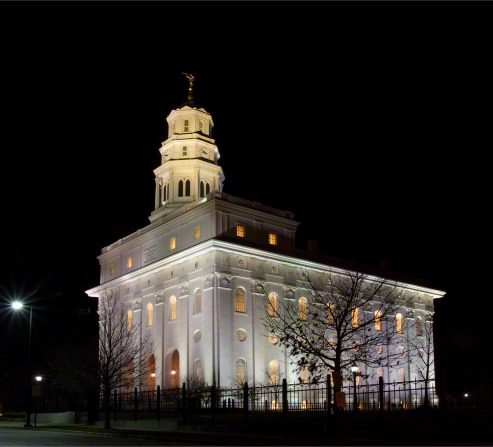
(LDS Media Library)
From a testimony of Elizabeth Brotherton Pratt (1817-1897), an English convert to Mormonism who emigrated to Nauvoo, Illinois, in 1841, as it is reproduced in Hyrum L. Andrus and Helen Mae Andrus, Personal Glimpses of the Prophet Joseph Smith (American Fork, UT: Covenant Communications, 2009), 140:
After my father and our family apostatized and went away, I felt very sorrowful. One evening when going to bed I was feeling cast down, and my sister who had been dead for a number of years, came to me, called me by name and said “Be comforted, you are all right; you have a work to do for me.”
I wished to inquire what she meant, but she was gone. In two days after this the Prophet preached on the baptism for the dead.
As soon as the font was ready, I officiated for my sister as she had requested.
This story struck me, as there is a similar one in my own family.
My father joined the Church relatively late in his life. (I baptized him on the same night that I was set apart as a missionary.) Years later, he became quite involved with family history research. At one point, though, he discovered that somebody else was submitting genealogical materials regarding his family for temple ordinances, and he was quite puzzled. He was, he thought, the only Church member in his extended Scandinavian Lutheran family.
To his surprise, we eventually discovered that the daughter of his favorite cousin (a cousin who had died several years earlier) had joined the Church in Colorado and had been submitting names for temple work. (My father lived in California.) When I met her the first time, she told me the story of her conversion and of how, shortly after her own baptism, her father had appeared to her in a dream (actually, I believe, in several dreams over a period of time), encouraging her to do some kind of “work” for him. She couldn’t figure out, at first, what he was talking about. She knew nothing of “vicarious work for the dead.” Finally, though, she learned what was intended, did his work, and then went on to pursue further family history and temple work thereafter.
***
Some items that a few might find of interest:
“Is the Book of Mormon’s Depiction of Guerrilla Warfare Realistic?”
I’m personally quite interested in the topic just above.
“122 Year-Old Woman From Mexico Is Baptized Into The LDS Church”
“What Book of Mormon Central is doing to bring ‘greater understanding’ and reach ‘tens of millions'”
The article above is a report on the very successful BMC conference that was just held this past Saturday.
“The charge of plagiarism in the Book of Mormon and Radical New Testament Scholars: A Parallel”
“Russell M. Nelson vs. Naive Views on How Leaders Receive Revelation”
In connection with this latter item, was anybody else struck by this part of what Elder Quentin L. Cook of the Quorum of the Twelve said in the Sunday afternoon session of the recent General Conference of the Church?
In conclusion, please be assured that senior Church leaders who preside over the divinely appointed purposes of the Church receive divine assistance. This guidance comes from the Spirit and sometimes directly from the Savior. Both kinds of spiritual guidance are given. I am grateful to have received such assistance.
***
I’ve just found out that one or two folks at the Maxwell Institute were upset by my 21 March blog entry titled “The Bad Old Days of Peterson at the Maxwell Institute,” feeling that I had portrayed them as being in league, or in significant sympathy, with the vocally ex-Mormon John Dehlin.
This was not my intent. I was responding to John Dehlin, not to them. But he plainly feels more friendly to them than he does to me, and he has repeatedly expressed his satisfaction with the 2012 redirection of the Maxwell Institute and with my dismissal from it. He brought them up. I responded.
I continue to disagree very deeply with the Maxwell Institute’s “change in course” — a change that I consider both regrettable and, in a sense, quite unnecessary and unnecessarily polarizing — and with the manner in which it was effected. I don’t back away from that disagreement. (I also disagree, for the record, with KBYU-FM’s decision to abandon its focus on classical music.) But I haven’t been campaigning on the matter. I’ve commented only infrequently about it. Truthfully, I seldom think about either it or the Maxwell Institute any more. I’m busy with other things that I consider more important and also, for that matter, both more pleasant and more satisfying. But I do respond and I will continue to respond when, as in this recent case involving John Dehlin, I come across grossly false and misleading public accounts of what happened. As I’ve said, I simply won’t stand idly by while history is falsified and my character is called into question. I’m funny that way. I guess that I’m enough of a historian to care about what goes into the public record regarding . . . well, me. But no offense was intended to anybody currently or formerly connected with the Maxwell Institute. They’re doing reasonably well, so far as I’m aware, in the new mission that they’ve chosen for the organization. I wish them no ill.










